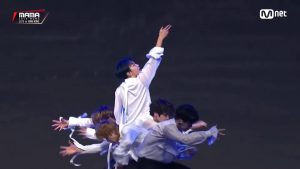
Seventeen first broke onto the scene with an infectious, funk- and hip-hop-laced style of pop, establishing a stronghold in this sound and its accompanying bright boy-next-door image. Over the course of their four-year career, they achieved the delicate balance that artists need to grow and flourish: keeping to their niche even as they push it by experimenting with new styles and genres.
Bubblegum pop, ballads, and hip-hop/ rap have always been familiar territory for Seventeen’s group and unit releases, and their title tracks in the past two years also dipped into trendier genres like EDM, future bass, and future R&B. “Sensual” is not a word that immediately comes to mind when thinking of Seventeen’s discography, but a comb through their B-sides yields a surprisingly solid selection of songs characterised by this quality.
Not many K-pop artists anchor their music in a sensual sound, but the few who do give their own unique twist to it—think Gain‘s theatrical approach to sensuality in “Paradise Lost”; the Wonder Girls‘ glorious plunge into 1980s synth pop in I Feel You; Jonghyun‘s playful discography rooted in R&B and buoyed by his bright falsettos that stretch with desire; and Taemin with his breathy, groovy solo releases.
Seventeen’s take is distinctly edgier, leveraging on the contrast between sharp beats and airy, sensual vocals to create a tension that heightens the thrill of the listening experience. We see this exhilarating effect in their latest release, “Hit”: it layers Jeonghan‘sand Woozi‘s soft deliveries of the opening verses over a pulsing electro-pop synth, and juxtaposes crisp beats with sexy falsettos from Joshua and Seungkwan in the pre-chorus.

The sensual overtones in their music often appear in unlikely ways. Take “Lilili Yabbay” (Teen,age), their most experimental and sonically distinct track to date, for example. It opens with rippling, otherworldly synths, and an electric guitar creeps in, accompanied by heavily distorted vocals that echo Hoshi‘s verses. Amidst this dissonant soundscape, Jun‘s light, enchanting falsettos come as a shock.
This combination transports the listener into another dimension—a fantastical effect befitting the lyrics, which describe dancing for a dreamlike lover in the titular, imaginary thirteenth month. The rest of the track continues exuding an air of mystique and sensuality by contrasting sharper sounds—such as the central synth motif that pelts down like raindrops in the chorus—with Jun’s soft voice and Dino‘s restrained rap in the verse before the final chorus.
“Flower” adopts a similar contrast to a different but equally riveting effect. While “Lilili Yabbay” is an experiment in heavy distortion, “Flower” showcases mastery of stereo mixing. It begins by centring on a hang drum-like synth. Percussive ornamentations plink and flutter in from different directions in the background as Jeonghan delivers smooth vocal runs. The surround-sound effect that this mixing produces becomes even more pronounced in Wonwoo‘s rap verse.
Dino’s sharper lines in the pre-chorus are offset by the fluidity of the “yeh” motif. This tension subsides briefly in the chorus, which melds Seungkwan‘s powerful delivery with crisp, percussive beats and a pulsing heart of bass synths so subtle it’s barely discernible, even as it holds sway over the listening experience. In the last line of the chorus, the instrumentals fall away, laying bare the lightly distorted, seductive “‘Cause you’re my flower”. Here, the contrast between edginess and sensuality returns again, but it becomes synthesised into a whole instead of remaining as separate parts.
As skillful as the production of “Lilili Yabbay” and “Flower” may be, though, the songs can only be this beguiling because they capitalise on the distinct vocal colours of the members. One of their earliest dips into a more sensual sound, “Fast Pace” (off their third EP Going Seventeen), shows a similar strength. Underpinned by a metallic, syncopated beat and hints of a baritone saxophone, Hoshi’s groovy delivery gives the Vocal Team a run for their money.
The juxtaposition of the staccato beats against Jeonghan’s languid vocals and DK‘s smooth glissandos is deliberate: it gives musical form to the song’s message, which uses the metaphor of a love interest walking too fast to express a mismatch in the relationship. Aside from the vocals, another highlight of “Fast Pace” is the interesting use of instrumentation. Just as the listener starts to get familiar with the tango-like rhythm, a jazz flute enters, even adding an almost improvisatory turn, further cementing the song’s sensual vibe.
“Crazy in Love” (Al1) is likewise fascinating in this respect, weaving sparkling, cascading synths with cymbals and various vocalisations, including tongue trills. There’s also a touch of funk guitar and the tinkling of bar chimes in the build to the chorus. But as with all the other songs, it relies chiefly on the vocals—Jeonghan’s falsettos, Vernon‘s breathy rap sections, and Dino’s feather-light “When I’m talking about love woo”—to evoke sensuality.
Compared to the tracks discussed above, “Moonwalker” (You Make My Day) is more on the pulse of current music trends, blending piping future bass/ tropical house synths with R&B and deep bass. Although it suffers from the unfortunate tendency of recent K-pop to substitute a post-chorus (which limits vocal parts to a chanted word or phrase) for an actual chorus (with a melody), its charm is again boosted by Hoshi’s unique timbre in the pre-chorus.
“Shhh” (You Made My Dawn) incorporates another trend: the anti-drop. It begins off-kilter, as though picking up from the middle of the song, with Hoshi rapping almost at a speaking pace, followed by a tinny, warping synth that enters on the downbeat. After a few verses, the synth disappears, replaced by a sharp percussive beat that builds to a false drop. A deep house beat, punctuated by wolf whistles, warbles as The8, Dino, and Hoshi take turns rapping in a whisper, at times rising above the vocals.
As with “Home”, in which the anti-drop emphasises the vulnerability of the chorus, the musical form reinforces lyrical content here: the boys subdue voices of uncertainty, whispering an appeal to their love interest to trust them. In a track filled with surprises in instrumentation, the members’ largely restrained vocals is a constant that brings out a seductive mood.
Across the different B-sides, it’s clear that a common strength is Bumzu and Woozi’s deep understanding of the members’ vocal colours, and the way that they harness this knowledge to the mood and the needs of each song. As Seventeen continue exploring different genres and gear up for their September comeback, they would do well to hold on to this niche.
(YouTube [1] [2] [3]. Images via Mnet, Pledis Entertainment. Lyrics via Genius. The Bias List [1] [2].)


